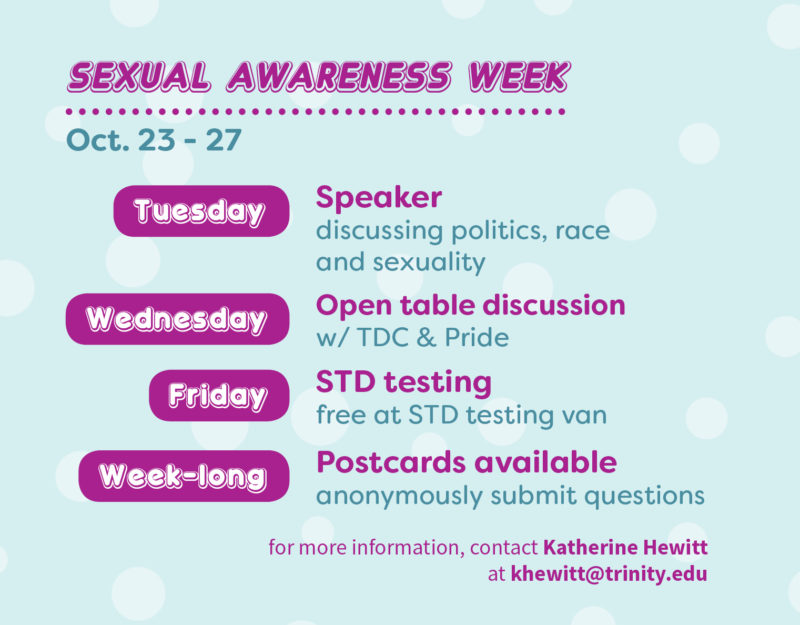Students enrolled in the Wellness Practicum course are teaming up with Wellness Services to put on a week of programming called Sexual Awareness Week, or just Sex Week, for the purpose of promoting safe sexual practices and creating a judgement-free discussion of topics traditionally seen as taboo.
Sarah Van Alsten, senior neuroscience major enrolled in the practicum, explained the motivations behind the program.
“The goal is to help answer any questions that the student body may have regarding sex and sexuality in a judgement-free zone and to promote healthy sexual behaviors. We want to normalize the topic and help students explore what they feel comfortable with,” Van Alsten wrote in an email interview.
The Wellness Practicum course puts on many of these types of events each year, covering a variety of topics relating to student physical and mental health.
“Our goal is to coordinate campus programs that focus on public health for the Trinity community, including Mental Health Week, Sexual Awareness Week, the Body Project and nutrition and exercise programming,” Van Alsten wrote.
Katherine Hewitt, coordinator of Wellness Services, elaborated on the types of programs they are planning for this year’s event.
“Sex Week programs offer informative and inclusive discussion, posters, speakers, Q&A and more to build knowledge and skills relating to human sexuality topics,” Hewitt wrote in an email interview. “Wellness Services, including wellness practicum students, student representatives from TDC, PRIDE and Trinity Progressives have all contributed ideas and assisted with program planning. Programs include Q&A sexual health postcards, “˜Sex Talk’ fill-in poster in Coates lobby, speakers regarding sexuality and politics and race, STD testing, Coalition Cafe regarding campus climate and sexual assault prevention, and sexual health vendor fair.”
Hewitt also explained why the program is necessary to the university’s community.
“Many students who attend Trinity might not have received comprehensive sex ed in high school. So, this is a great opportunity for those who are new to these topics, or those students who have a little more knowledge and experience but are just interested in learning more,” Hewitt wrote.
Alex Motter, a sophomore business analytics and technology major and PRIDE member, relates to this experience that Hewitt mentions.
“I came from a background in which the only formal sex ed I received was abstinence-based. While some might be able to argue that abstinence is the only education necessary, in reality sex education is important regardless of your orientation or frequency,” Motter wrote in an email interview. “Just as important as simply knowing how to put on a condom is being able to fully understand the risks associated with the act you’re doing.”
Motter explained that sex ed, even when taught in high school, still omits important things like sex for all sexualities. Sex ed encompasses all parts of sex, including the threat of sexually transmitted infections, especially in the LGBTQ community.
“Sexual health is incredibly important to the gay community, particularly considering the disproportional amount of STIs,” Motter wrote. “Sexual education is of paramount importance to LGBTQ individuals, and given the margins of people who are still unaware of the dangers of their actions events like the Sexual Awareness Week are more crucial now than ever.”
The schedule of events intends to bring awareness to campus, to give importance to a subject that often is not discussed and to educate community members of the resources that are available to them.
“Ultimately, engaging programs like this prevent public health concerns such as teen pregnancy, sexually transmitted infections, sexual assault and more,” Hewitt wrote. “Also, knowing about campus and community resources is vital for students to become their own advocate and manage their own sexual health and wellness.”
Van Alsten also wrote to the importance of participating in Sex Week programming.
“Students should care because sex is a normal part of life, but we treat it as so taboo. A lot of people feel embarrassed and that prevents them from seeking guidance, and this can be harmful both physically and mentally,” Van Alsten wrote.
For any questions about sexual health or Sexual Awareness Week, contact Katherine Hewitt at [email protected].







